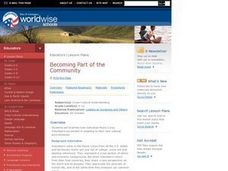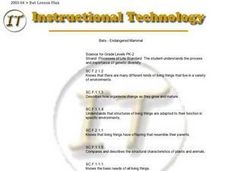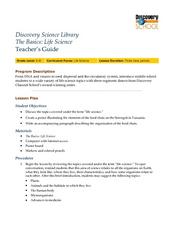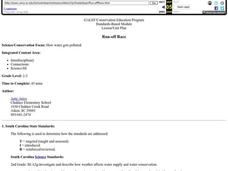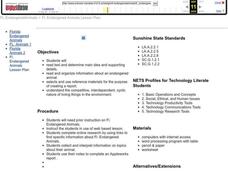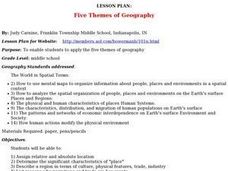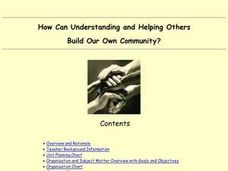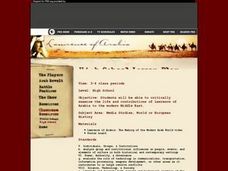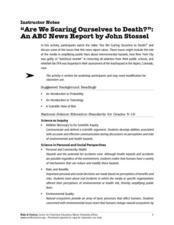Curated OER
Word Search
Here is a word search that has more educational value than most. After finding the 14 words that have to do with natural resources, learners must then use the words in context. They answer 14 questions on the second page of the...
Curated OER
Becoming Part of the Community
Students identify how various cultures are similiar. As a class, they read an essay of a Peace Corps volunteer being integrated into their new community. In groups, they take the elements from the story and put them into different...
Curated OER
The Bubonic Plague and Health
The Bubonic Plague is a fascinating study. Your class will discover the causes and effects of the plague and how it was spread. Additionally, they will learn how the spread of the plague helped people understand the importance of good...
Curated OER
The Math of Renewable Energy
Students research additional information about questions on their worksheet. In this energy activity, students develop visual aids of their proposed solution to the problem. They present their work in class.
Curated OER
Globalization and Consumerism
Is the expansion of American corporations abroad a good or bad thing? After examining the global operations of Ford Motor Company, McDonald's, and Walmart, class members are asked to evaluate the impact of globalization and consumerism.
National Nanotechnology Infrastructure Network
Help or Hype: The Ethics of Bio-Nanotechnology
Ethical concerns are not always black and white. A well-designed lesson plan presents learners with scenarios for which ethics may come into question. Scholars learn to consider the different sides of a situation and make an unbiased...
Kenan Fellows
Assembly Required and the Design Process Too!
Do your part to make manufacturing more manageable. A capstone project challenges each group to identify and research a manufacturing process for a product. To complete the activity, they create a presentation for business and community...
Curated OER
Bats - Endangered Mammal
Students complete question sheet on Bats and research information using a list of websites provided by the teacher. They work with peers to complete a scavenger hunt worksheet about bats.
Curated OER
Tee Time: A Lesson About Nonpoint Source Pollution
Learners assume assigned roles as citizens in a town meeting where wealthy investors have persuaded the city government to clear an area of town to build a golf course. They are to investigate their roles and prepare a speech in support...
Curated OER
The Basics:Life Science
Students explore concepts in life science using segments drawn from Discovery Channel. In this life science lesson, students participate in discussions about the food chain. Students create a poster to illustrate a predator and prey...
Curated OER
Run-off Race
Students create wetland models in pans and use them to experiment to see how plants help slow the flow of runoff water and keep our waterways clean.
Curated OER
Endangered Animals
Young scholars discuss animals then research endangered animals using the computer and the Internet. They organize information then create a report on a chosen animal using Appleworks.
Curated OER
Lesson Plan: Five Themes of Geography
After learning the five themes of geography, learners take an Internet trip and categorize information found into one of the five themes. They answer five questions about the places explored. That is about all there is to this lesson; it...
Curated OER
How Can Understanding and Helping Others Build Our Own Community?
Students examine the different cultures and disabilities people face in their community. They discuss how they can become better citizens. They answer discussion questions to finish the lesson.
Curated OER
Our Water Resources
Students build a model aquifer to study groundwater zones and water table formation. Students use the models to measure the movement of polluted groundwater.
Curated OER
Because We Can, Should We?
Young scholars identify a position on an issue of geographic importance and support it They read the story "By the Waters of Babylon," and write a paragraph explaining what they think the relationship between Babylon and the Biblical...
Curated OER
Dark and Beautiful Caves
Students research how caves form. They describe the major stone formations in caves by taking notes. They construct a clay model of a cave and mark each formation making it easy to identify in the legend.
Curated OER
Laurence of Arabia
Students critically examine the life and contributions of Lawrence of Arabia to the modern Middle East. They view a video on Laurence of Arabia. Students discuss the movie. Students create a propaganda posters or stories identifying...
Curated OER
Understanding the Problems of World Hunger
High schoolers explore the issue of world hunger. They examine hunger on a personal level and explore what it means to be hungry or starving. They discuss the causes of hunger and the effects of hunger on nations.
Curated OER
Around the World At 30o North Latitude
Reinforce the use of an atlas and reference materials with writers. They discover how geographic location can make living easier or harder. They draw an assigned journey on a map, categorize survival needs, and prioritize options during...
Curated OER
What can I do?
Pupils identify feelings and explore positive ways to handle conflict. In this mental health lesson students discuss feelings and how to constructively handle them.
Curated OER
From Restriction Maps to Cladograms
Biology aces analyze restriction maps to determine the relationships among different primate species and then complete a cladogram. Preface this lesson with an explanation of how restriction enzymes are used to create the DNA maps....
Curated OER
We're on the Map!
Students identify a variety of topographic map symbols. They make generalizations about an unidentified community by reading and interpreting map symbols.
Curated OER
Are We Scaring Ourselves to Death?
Interesting! Have your high schoolers watch this 13-minute clip from the documentay, "Are We Scaring Ourselves to Death?" It examines the fear we have as a culture about death and whether or not the media increases those fears. The focus...



